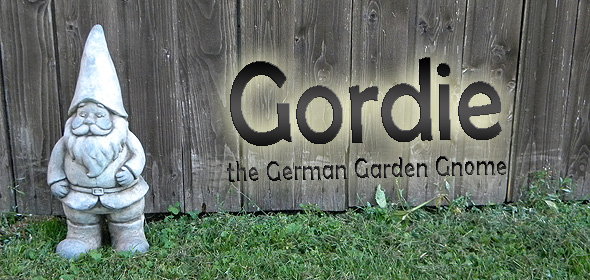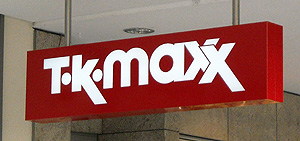
The first thing we did was visit the local garden shop (Hanns Gartnerie), where I finally bought my very own German gnome. I christened him Gordie. Gordie the German Garden Gnome.
He’s colorless at the moment, but not only is he a bonafied German gnome, he’ll be a project, and he was 1/2 off … everything I was totally looking for.
Then we visited Saarbrucken, the city of bridges, and Saarbrucken has those bridges because the city is built around the river Saar. Hence, the name (brucken means “bridges”). Saarbrucken is also a city of shopping when you count the Europagalerie to the St. Johanner Markt. That’s almost a full kilometer of shopping!
Look how European I’ve become. I still don’t know how long a kilometer is, but I sound very natural saying it.
The Europa Gallery is a shopping mall in the traditional sense, full of teens, escalators, and over-priced merchandise. Yeah, we didn’t stay long.
We walked down the Bahnofstrausse, which is a street that was turned into a pedestrian thoroughfare, from the Europa Gallery to the St. Johanner Markt. On the way were hundreds of shops on the main strip and just off it (and under it for that matter), everything from Starbucks to shoe stores to lingerie shops .
We ate a simple lunch of pizza at Iss Was, a little joint on the outskirts of the Markt Square. Iss Was means “Eat What.” Confusing, huh?
CORRECTION: A French dude emailed me that “Iss Was” stands for “Iss Etwas,” which actually means, “Eat Something.” Makes more sense now.
 On the way back, we stopped at TK Maxx. For some reason, they don’t call it TJ Maxx over here. I guess the Germans have an aversion to the letter J, which would explain why it’s pronounced like a “y” when used.
On the way back, we stopped at TK Maxx. For some reason, they don’t call it TJ Maxx over here. I guess the Germans have an aversion to the letter J, which would explain why it’s pronounced like a “y” when used.
You know what word they use for Clearance? “Sale.” That made my shopping experience much easier. So, at a TK Maxx in downtown Saarbrucken, I bought a pair of Timberlands made in Vietnam, a wickfree sports shirt made in Britain, and presents made in Turkey, England, and Spain.
Europe is not too unlike the States.
After Saarbrucken, we took a jaunt over the border to France, just so we could each say, “I’ve been to France.”
Then later that night, we went to dinner with Shea’s neighbor, Willie, and his two German friends who don’t speak a lick of English. We learned some German, and they learned some English, and we all had a great time. Even the barkeep/waitress, a young woman with a smidgen of English and a busload of patience, had a great time serving us.
But that night I learned more than how to correctly say mushrooms in German (“pilz” or “champignons,” which is actually French also); I learned something that can be verified by centuries of writing: food and wine bridges all language gaps.

